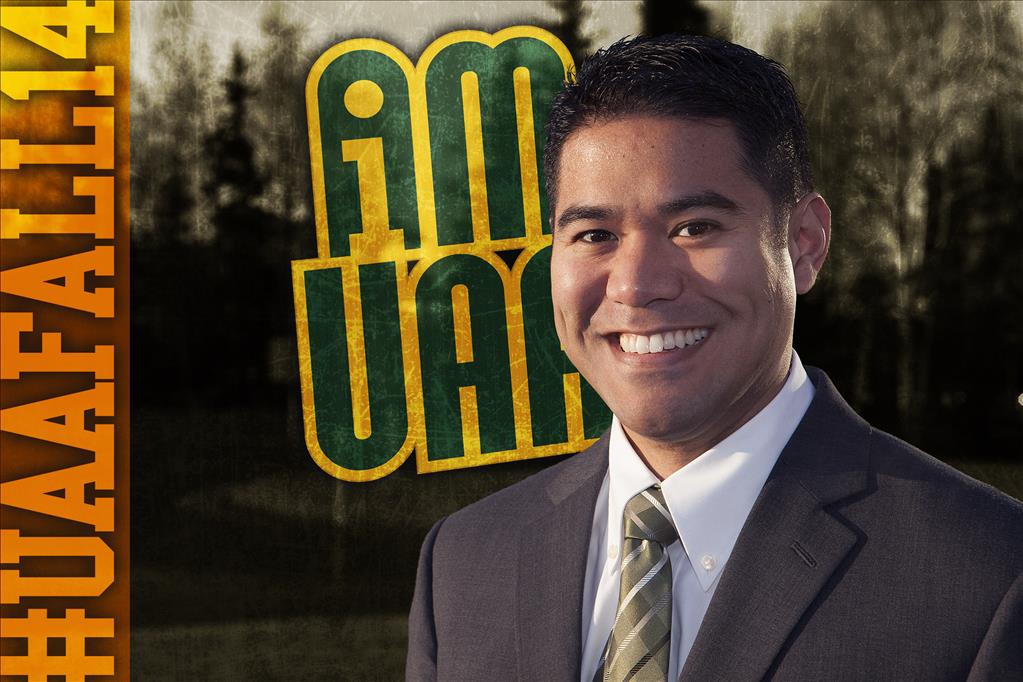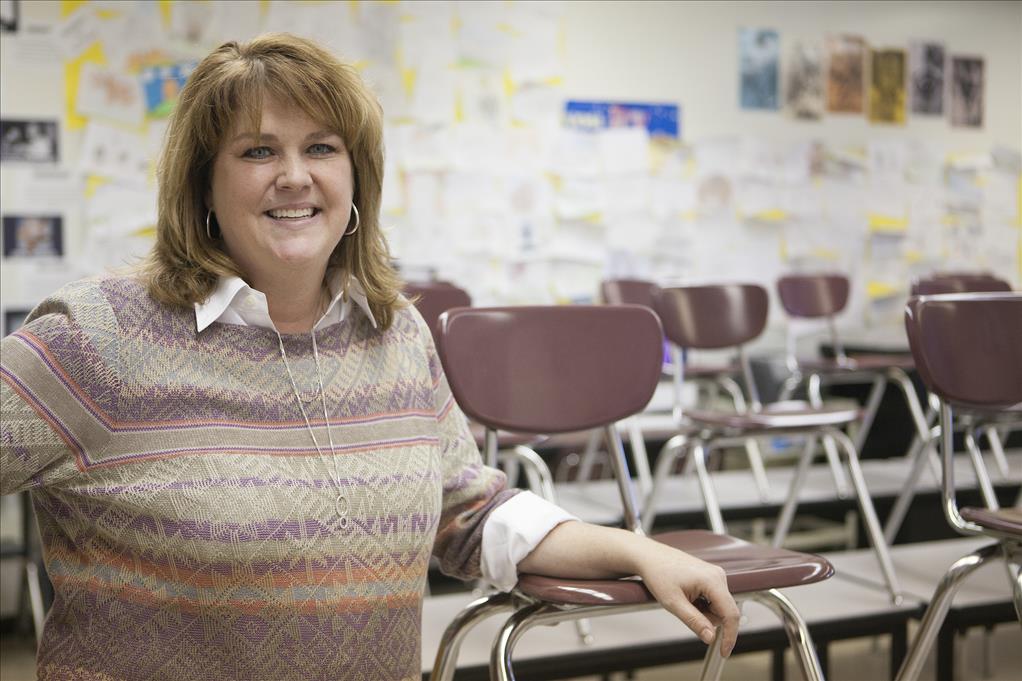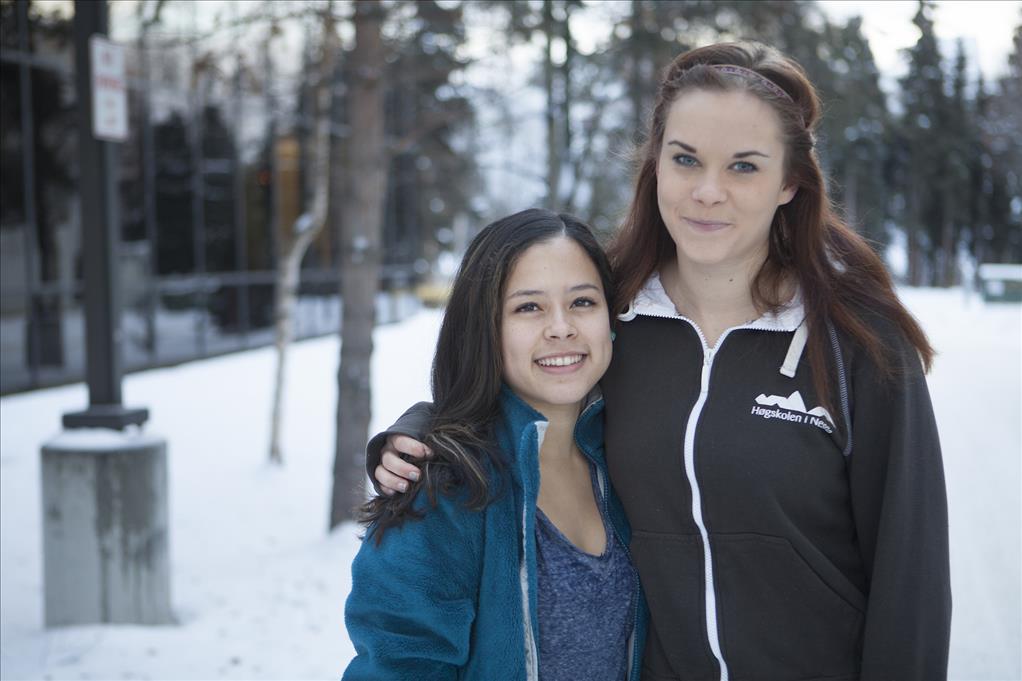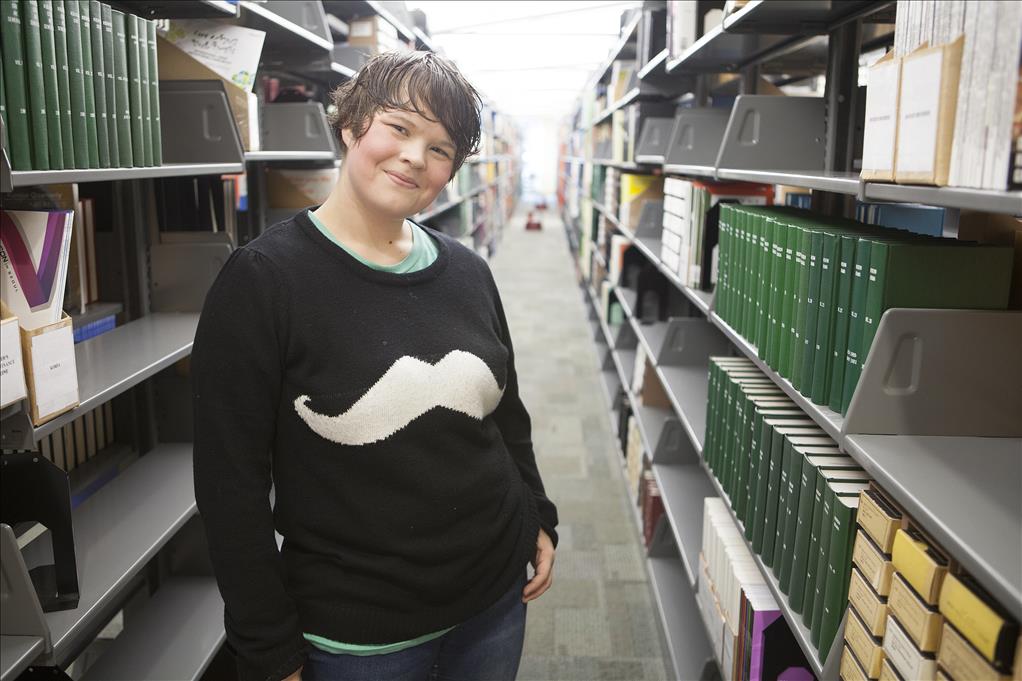Alumni Spotlight: Claude Emile Mabudu
by Tracy Kalytiak |
Alumni Spotlight: Claude Emile Mabudu B.A. Languages '13 Hometown: Lomé, Togo Fun Fact: Claude speaks five languages: French, English and three African dialects.

Claude Mabudu fled his native country of Togo and spent seven miserable years in
Mali before moving to Anchorage.
Philip Hall / University of Alaska Anchorage
Claude Emile Mabudu was just 17 years old when officials in his native country, Togo, ordered teens to tell if their parents had guns at home. The officials said they would come to take the guns, but promised they wouldn't hurt the kids' parents.
Claude didn't believe that, since people in Togo's capital, Lomé, tended to vanish or end up dead if they opposed the dictatorship of the president, Gnassingbé Eyadéma.
"I am shocked, can't react there, but decide in my mind and in my heart this is a regime I have to fight," Claude said.
That moment transformed Claude into a dissident and refugee, and set him on a path that took him from Togo to Mali and, finally, to Anchorage.
Now, Claude, 55, studies languages and tutors at UAA, serves as a delegate to the Refugee Congress and lives in Anchorage with his wife, Kayissan Ajavon, and their five children, ages 7 to 23.
Fleeing a terrifying world
Togo-officially known as the Togolese Republic-is a 21,925-square-mile sliver of West Africa sandwiched between Benin, Ghana and Burkina Faso. Claude's hometown, Lomé, perches on the edge of the Bight of Benin and leans against Ghana's eastern border.
Claude was born in 1958, the year rich, London-educated Sylvanus Olympio became prime minister of Togo after leading a post-World War II movement to gain independence from French influence. When Togo actually became independent in 1960, Olympio resoundingly defeated his brother-in-law, Nicholas Grunitzky, in Togo's first presidential election.
Olympio tried to rein in military spending, infuriating Eyadéma and other ex-French soldiers who were not allowed to enlist in Togo's 250-soldier military force.
Three years later, members of the military broke into Olympio's home in the middle of the night. His body was found at dawn, three feet from the gate of the nearby U.S. Embassy. Grunitzky became the next president and, four years later, Eyadéma took control of Togo.
Against this turbulent political backdrop, Claude's parents-both health-service workers-were raising their family of three sons and two daughters in a place Claude says was otherwise a "very friendly, very nice country."
Eyadéma, after surviving a plane crash in 1974, decided to scuttle his French first name-which was then "Étienne"-and adopt an African first name, "Gnassingbé." Claude said he and everyone else in Togo also had to drop their French names and adopt African names. Claude's name became Zénawo Sépopo Mabudu.
"You can't go to the hospital, to school, anywhere, [unless you've adopted an African name]," he said. "You cannot do anything."
French President François Mitterrand gave a speech in 1990 that tied development aid to democratic efforts by Togo and other former French colonies. Riots followed, leading to a National Conference and the Eyadéma government's agreement to allow Claude and others in Togo to reclaim their given names. At this point, Claude was married, starting a family and participating in political activities; he was district president of Togo's main opposition party, Union of Forces for Change. He fled the country after narrowly avoiding officials who came to his home to arrest him.
Claude and his family ended up in Bamako, Mali, where they spent seven miserable years.
He worked as a school librarian and language teacher and his wife worked as an elementary-school teacher. They had three children when they first arrived in Mali, and lived in a single room. The rent was high and sometimes they couldn't pay it.
"We got starvation wages," Claude said. "We were paid only seven months a year. Sometimes we didn't eat at all. You have today, you don't have tomorrow. If your son is sick, you don't have a penny to buy medicine for him and you have to see him suffer like that. My wife was sick with malnutrition and malaria. It was very, very hard. We were close to dying."
"I used to say God is from my village," he said. "One day my cell phone rang and a voice said, 'Why are you still hiding?'"
Moving 7,526 miles from home
A representative of the UN High Commissioner for Refugees (UNHCR) had been looking for Claude and wanted him to apply for refugee resettlement. Claude filled out the application. Another call told him his application had been selected. Two years later, the family boarded a plane and started their journey to New York.
"We told people we were going to leave," Claude said of their departure from Mali. "They knew we were poor and they couldn't believe it."
When the family arrived in New York, they learned where their voyage would ultimately be taking them.
"They gave us a badge and on it was written 'Anchorage,'" Claude said. "We read this the way you'd read it in French: 'Ahn-shor-ahge.' A lady from the Ivory Coast who spoke French told us we were going to Anchorage in Alaska. She said it was very far, very dark and very cold."
Claude didn't know much about Alaska. He knew Alaska once belonged to Russia and that a massive earthquake struck the state in the 1960s.
"We came on May 20, 2008," he said. "There wasn't snow, but it was cold. I had asked to be given a city with no violence where I could live with my family and there was no discrimination. This is like a movie-this is the city I asked my God to give me."
Four Catholic Social Services case managers welcomed the family at the airport, gave them presents and took them to Mountain View.
"We had an apartment with everything," Claude said. "That was the first day I got to sleep on a bed since I left my country."
Claude, his wife, and their three younger children became United States citizens last year. "It was one of the most beautiful days in the story of our life," he said.
The couple launched a nonprofit organization, Refugee Hope Project, to help refugees find hope, start a new life and find fresh opportunities in the United States. "I cannot forget the people who are still suffering in Africa," Claude said.
Anchorage holds refugees not only from Togo but from Sudan, Somalia, Congo and Ivory Coast. Claude would like to find office space and a way to provide Internet service so refugees here can research job and housing prospects.
The Mabudu family no longer lives in that Mountain View apartment. They helped construct and then bought a Habitat for Humanity home and have been learning about American culture (McDonald's was an early favorite) as well as Alaska culture (they've journeyed to the Kenai Peninsula to dipnet for salmon).
Claude worked as an air-cargo agent. Now, he and Kayissan are full-time students and French language tutors. Oldest son Elolo resides in Anchorage and works at Sam's Club; oldest daughter, Ghislaine, 20, attends UAA and has a major in social work; the couple's younger son, Josue, 13, goes to Clark Middle School and their younger two daughters, Gina Esmeralda, 9, and Johanna Gloria, 7, attend Wonder Park Elementary.
"They speak good English," Claude said of his children. "They're our teachers."
The most difficult adjustment, Claude says, has been coping with the cold climate here. Lomé is 425 miles from the equator. Anchorage, however, is close to 10 times farther away.
"But, you know, the cold is compensated with the warmth I've found in people," he said. "It is nothing compared to what we faced in Africa. When your country is on fire, the country that opens its gates for you is your country. God always puts in my way people who help."
Written by Tracy Kalytiak, UAA Office of University Advancement.
 "Alumni Spotlight: Claude Emile Mabudu" is licensed under a Creative Commons Attribution-NonCommercial 4.0 International License.
"Alumni Spotlight: Claude Emile Mabudu" is licensed under a Creative Commons Attribution-NonCommercial 4.0 International License.














